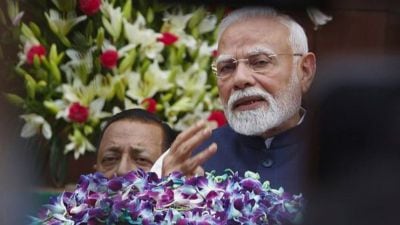Involved in terror, violence and extortion, terrorist Happy Passia to be extradited from US
Punjab Police officers say Happy Passia functioned as a direct asset of Pakistan’s ISI, executing tasks under the direction of Harwinder Singh Rinda.
 Harpreet Singh alias Happy Passia, a resident of the Passia village in the Ramdas area of Amritsar district, has emerged as a significant figure in a cross-border terror network orchestrated under the umbrella of the proscribed outfit Babbar Khalsa International (BKI), with direct support from Pakistan’s Inter-Services Intelligence (ISI). (Photo: FBI/X)
Harpreet Singh alias Happy Passia, a resident of the Passia village in the Ramdas area of Amritsar district, has emerged as a significant figure in a cross-border terror network orchestrated under the umbrella of the proscribed outfit Babbar Khalsa International (BKI), with direct support from Pakistan’s Inter-Services Intelligence (ISI). (Photo: FBI/X)Law enforcement authorities in the US have acknowledged the requests of the Indian Government regarding the extradition of notorious gangster and terrorist Harpreet Singh alias Happy Passia to India.
Confirming this, senior Punjab Police officers said Monday that Happy Passia’s anticipated extradition is seen as a diplomatic victory and a sign of India’s strengthened counter-terror collaboration with the United States.
“If extradited, Harpreet Singh will be interrogated by the National Investigation Agency (NIA) and the Punjab Police. Our focus will be on uncovering the international network of terror funding, recruitment, and logistics, with particular attention to his links with overseas Khalistani cells and handlers within Pakistan’s ISI,” a senior officer said.
Another senior Punjab Police officer said the extradition of Passia will present a rare opportunity to expose the technical infrastructure, tradecraft, and digital tools used by terrorist groups to radicalise vulnerable Indian youth and orchestrate attacks on Indian soil from abroad.
“Harpreet’s detention and potential extradition are being viewed as a major setback to the ecosystem of overseas-based terrorism that has long targeted India. Terror groups like BKI have leveraged diasporic enclaves and digital platforms to spread anti-India propaganda, raise funds, and plan attacks,” he said.
Sources say Passia’s interrogation may help Punjab Police to identify recruitment patterns and digital radicalisation tactics, map out funding channels and cross-border collaborators, and neutralise sleeper cells and logistics hubs across North America, Europe, and India.
“This development could also serve as a deterrent for foreign-based operatives who have, until now, exploited safe havens in the West to foment unrest in India. Moreover, it reinforces India’s message that those who sponsor or execute terror against the nation, no matter where they hide, will be brought to justice,” another officer said.
Who is Happy Passia?
Harpreet Singh alias Happy Passia, a resident of the Passia village in the Ramdas area of Amritsar district, has emerged as a significant figure in a cross-border terror network orchestrated under the umbrella of the proscribed outfit Babbar Khalsa International (BKI), with direct support from Pakistan’s Inter-Services Intelligence (ISI).
Initially associated with the Jaggu Bhagwanpuria gang, Passia’s criminal trajectory escalated sharply over the years, eventually tying him to radical elements and designated terrorist Harwinder Singh Rinda.
Under the direction and backing of Pakistan’s ISI, officers say Passia and Rinda orchestrated a sustained campaign of terror and extortion across Punjab, Maharashtra, and other states. They added that acting as instruments of ISI’s broader agenda to foment unrest and destabilise internal security, their activities targeted police establishments, retired and serving police officers, liquor contractors, businessmen, and socio-religious leaders — intended to create fear and disrupt communal harmony.
From Punjab and Dubai to UK and US
Happy Passia left for Dubai in 2018, where he became involved in illegal liquor smuggling, and forged connections with criminal cartels and Pakistan-based individuals. He returned to India in 2019, and soon after moved to the United Kingdom on a student visa. There, he came into contact with pro-Khalistani radicals.
In 2021, he subsequently entered the United States illegally via the ‘donkey route’ and took residence with known members of the Jaggu Bhagwanpuria gang, including Darman Kahlon, who is involved in narco-arms smuggling, and Amrit Bal who is linked to extortion and targeted killings in India between 2020 and 2023.
By 2023, Passia had fully aligned himself with Harwinder Singh Rinda, coordinating terror activities under BKI’s command. In August 2023, the Internal Security Wing of the Punjab Police uncovered a plan of target killings orchestrated by Rinda and Passia.
The Punjab Police have said they have foiled many terror plans masterminded by the Rinda-Passia terror network, arresting several of their local operatives.
Key crimes and associates
In the following months, Passia shifted his focus toward targeting businessmen, Hindu leaders, and serving or retired police personnel in Punjab. His operations were facilitated by foreign-based associates operating from the US, Armenia, Germany, the UK, and Europe.
Key associates include Shehzad Bhatti, Zeeshan Akhtar, a Lawrence Bishnoi gang member wanted in the Baba Siddique murder case, UK-based Nishan Singh, Armenia-based Shamsher alias Honey, Germany-based Swaran Singh, also known as Jeevan Fauji, Europe-based Gopi Nawashehria, and US-based Gurdev Jaisal, among others.
In January 2024, Happy Passia, along with Rinda, facilitated the killing of Hardeep Singh from Dera Baba Nanak. The Punjab Police arrested the shooters and recovered the weapon used in the crime. In April 2024, Sandeep Bedi alias Shera was killed by associates of Passia. Investigations later revealed the involvement of an Indian Army deserter, Jeevan Fauji, who subsequently fled to Germany and is now coordinating the activities of the Rinda–Passia terror network from abroad.
From September 2024 onwards, there was a marked shift in his strategy as his focus turned almost exclusively to Punjab Police establishments. Between late 2024 and early 2025, under his coordination, 16 terror incidents took place, including grenade attacks, an IED planting, and an RPG strike. His name surfaced either through direct claim of responsibility or through evidence of facilitating his network.
The Punjab Police traced all cases and arrested perpetrators and facilitators involved in the grenade blasts.
His name also figures in the National Investigation Agency (NIA)’s chargesheet filed in March 2024 in connection with the Chandigarh grenade attack, wherein Rinda and Harpreet were accused of funding, arming, and directing the operatives involved in that attack. The case was initially solved by the Punjab Police before being transferred to NIA for further investigation.
In February 2025, Happy Passia and Harvinder Singh Rinda were identified as the masterminds behind the Nanded (Maharashtra) shooting that left one dead and another injured. The Punjab Police have arrested six people in connection with the case including key shooters.
Punjab Police officers say Happy Passia functioned as a direct asset of Pakistan’s ISI, executing tasks under the direction of Harwinder Singh Rinda to advance its destabilisation agenda in India.
Comprehensive dossier
As a result of sustained efforts by the Punjab Police, over 1,500 individuals linked to Happy Passia were scrutinised, leading to more than 70 arrests. The Punjab Police busted more than 35 terror modules linked to the Rinda–Passia network involved in targeted killings, grenade attacks on police establishments, and extortion activities.
The Internal Security Wing of the Punjab Police maintained a comprehensive dossier on Happy Passia, and regularly shared intelligence with Central agencies. This was coupled with continuous technical surveillance and ground-level human intelligence, ensuring he remained consistently flagged across national security systems.
In addition, detailed intelligence regarding his operational activities, including digital footprints, communication patterns, and associations with foreign-based individuals, whether direct or through intermediaries, was routinely relayed to central agencies.
“This seamless exchange of intelligence played a critical role in maintaining national-level situational awareness and supporting the broader counter-terror framework,” a police officer said.












